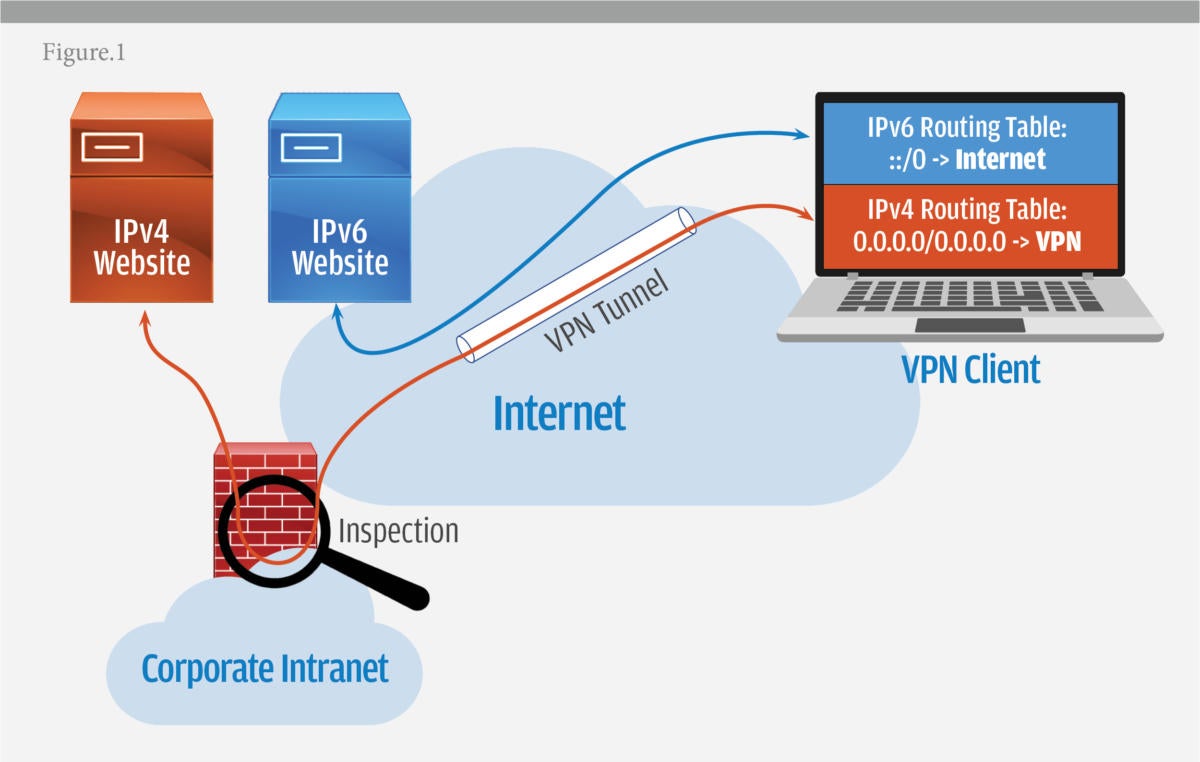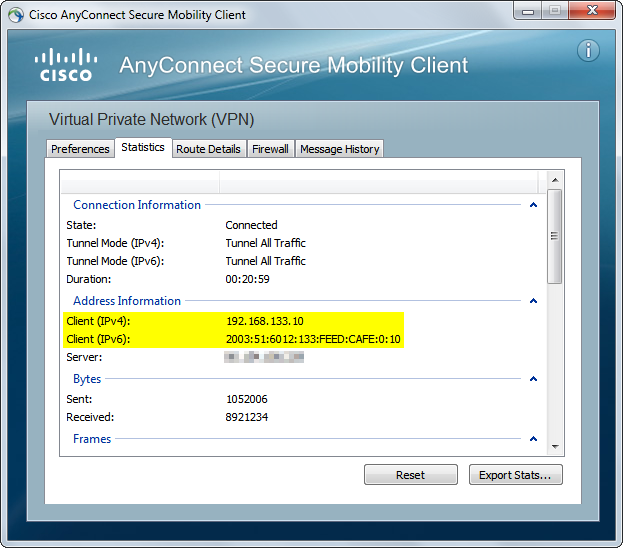This document provides a sample configuration for the Cisco Adaptive Security Appliance (ASA) to allow the Cisco AnyConnect Secure Mobility Client (referred to as 'AnyConnect' in the remainder of this document) to establish an SSL VPN tunnel over an IPv4 or IPv6 network. Hello Everyone- I can no longer connect to my corporate network from my laptop using my Galaxy S5 HotSpot and Cisco Anyconnect VPN. It used to work perfectly but not any more. I changed the APN settings to use IPv4 only and also IPv4/IPv6. Still not working. If while I'm connected to the VPN, I uncheck 'Internet Protocol Version 6 (TCP/IPv4)' of my local Ethernet adapter I then can browse the internet. Now I tried disabling the same IPv6 toggle on the AnyConnect VPN adapter but that has no effect. Only disabling IPv6 in my local machine's ethernet adapter allows the internet to be browsed.
Topics Map > Networking > Virtual Private Networking (VPN)
This page explains the distinctions between the Cisco AnyConnect VPN profiles available during the login process.
Nov 14, 2018 Information About AnyConnect VPN Client Connections. The Cisco AnyConnect Secure Mobility Client provides secure SSL and IPsec/IKEv2 connections to the ASA for remote users. Without a previously-installed client, remote users enter the IP address in their browser of an interface configured to accept SSL or IPsec/IKEv2 VPN connections.
Normal use: 'SplitTunnel' profile
Most people will ordinarily select the '1_SplitTunnel_(Default)' profile. This sends traffic meant for University computers to the University, and doesn't intervene in your non-University web browsing such as Facebook or Google. As of Fall 2018 both IPv4 and IPv6 traffic are supported by the VPN. Click here for more details on how exactly the IPv6 traffic is handled with Split Tunnel.
The Office of Privacy and Information Assurance (OPIA) suggests the use of the split tunnel profile from secured networks that you trust, such as home and work networks.
Special cases: 'TunnelAll,' 'SplitTunnel_NoPrivateIP', '2FA_Duo,' and 'ReduceDisconnects' profiles
Tunnel All (off-campus online resource use, traveling in countries with restricted network access)
The '3_TunnelAll' profile is used in cases where you need to present a University identity to a third party website, such as the Library's online resource collection. (See Library Resources and the VPN for more information about remote access to the Library's resources.) There are some other services provided to campus based on IP address in addition to those from the Library. Additionally, if you are traveling outside the US and want to reach US servers for services such as Google or Facebook then the Tunnel All profile will send all your data back to campus first, and then out to those services. Researchers accessing NIST data must use either '3_TunnelAll' or '4_TunnelAll_2FA_Duo' in order to be compliant with grant award restrictions. As of Fall 2018 both your IPv4 and IPv6 traffic are sent back to campus.

The Office of Privacy and Information Assurance (OPIA) recommends the use of the Tunnel All profile from untrusted networks, such as unsecured wireless networks, coffee shops, hotels, and other potentially vulnerable networks. This way all of your network traffic is encrypted on the path between your computer and the campus network, helping to protect your data from snooping.
Problem: I cannot connect to Tunnel_All VPN and local server or printer without being disconnected.
Cisco Anyconnect Vpn Ipv6 Settings
Answer: You need to check the box in settings for 'Allow local (LAN) access when using VPN' in your settings. That should let you keep access to the local samba server while using Tunnel All.
VPN, Configuration for local LAN access
SplitTunnel_NoPrivateIP
2FA_Duo (IT Pros and Secure Application Access)

ReduceDisconnects
The '7_SplitTunnel_ReduceDisconnects' profile is used when you are attempting to use the VPN from a congested or lossy network. The profile is designed to try and keep your VPN connection established even when you are experiencing brief network disruptions. This will not improve your overall network performance, but it will make it less likely that your VPN connection will be disconnected due to those network disruptions. Other than that, the profile is the same as the '1_SplitTunnel_(Default)' profile. Depending on some settings on your host operating system (related to TCP-Keepalives), it is possible that this profile will not work well. This limitation is the reason that it is not the default profile and it is only recommended in cases where the default profile has already been shown not to work well.
Why does the program default to SplitTunnel and not TunnelAll?

Tunnel All is required for library use, but usually slows people's network connection down for regular Internet use. Split Tunnel sends traffic for campus IP addresses to campus, but also lets all their traffic out to the Internet go straight to where it is going without the overhead of first encrypting it, then sending it to the university, having it unencrypted, and then sending it back out to the Internet. Then the response comes back to the University, get encrypted, and then sent back to their computer where it has to be unencrypted. That adds time, and the encryption process uses a lot of CPU power on their computer. It also sends all the traffic in and out of the University's Internet connection (multiple times) that otherwise doesn't need to be there, using a moderately expensive resource shared by all of campus.


Because of all the extra steps the data has to take with Tunnel All, most people have the best experience using the Internet and University resources at the same time with Split Tunnel.
Split Tunnel does let people connect to classroom servers, just not Library online resources. Classroom servers have University IP addresses, so the VPN sends that traffic to campus in either Split Tunnel or Tunnel All. The Library's online resources are located off-campus, and depend on checking your IP address to see if you are allowed to use them. That means the traffic must come from campus, so only Tunnel All works.
Cisco Anyconnect Vpn Address
Cisco Anyconnect Add Vpn
10 min issue 2graffiti movies & documentaries.
